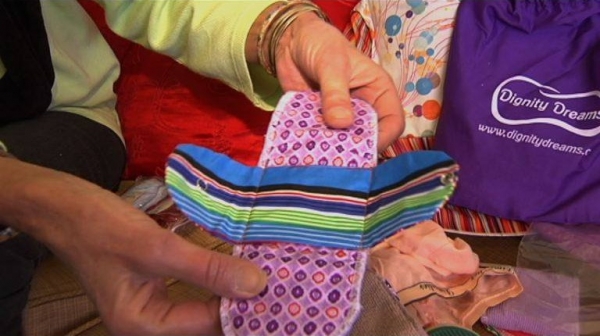Deputy minister swaps his T-shirt for sanitary pads

In 2011 President Jacob Zuma promised sanitary pads for girls and women who cannot afford them. Nearly five years later, the only sign that this promise is being kept is an attempt by Deputy Minister in the presidency Buti Manamela to raise awareness about the issue through a series of well publicised events.
Manamela auctioned his T-shirt for R3,000 at the 702 Walk the Talk event on 26 July 2015. He was raising funds to distribute 18,000 reusable sanitary pads as part of a Mandela Day initiative in partnership with Dignity Dreams, an organisation which manufactures and distributes reusable sanitary pads.
Many girls miss out on school every month because they cannot afford sanitary pads. Others use a variety of substitutes including socks. In 2011, during a speech to mark the ANC’s 99th birthday, president Jacob Zuma promised to deal with the problem.
“We will promote the provision of sanitary towels to women on the indigent list of municipalities,” he said.
In his State of the Nation address a month later, Zuma reiterated: “Given our emphasis on women’s health, we will broaden the scope of reproductive health rights and provide services related to amongst others, contraception, sexually transmitted infections, teenage pregnancy and sanitary towels for the indigent.”
But in spite of repeated attempts GroundUp has not been able to find out what has been done by the presidency or the rest of the government to keep the president’s promise.
In a statement this week, Manamela’s office said the deputy minister had challenged leading corporations “to meet the needs of South Africa’s schoolgirls during the 67 days between 13 May 2015 and Nelson Mandela International Day on 18 July 2015” and the response had been “overwhelming”.
The campaign had met its target of raising funds to distribute 18,000 Dignity Dreams packs to girls and women.
The statement read, “Deputy Minister Buti Manamela partnered with Dignity Dreams to ensure that girls are kept in school; facilitating the NYDA donation and walking for Dignity Dreams at the 702 Walk the Talk on 26 July. The minister then auctioned his 702 t-shirt for R3,000, which went to Dignity Dreams. Deputy Minister held a soccer knockout tournament to raise funds for the reusable sanitary packs.”
“We recognise the importance of young girls having access to safe and hygienic sanitary pads. It is an honour to support Dignity Dreams in the Nelson Mandela Campaign. We will continue in our partnership with Dignity Dreams beyond the Mandela Month and we will not rest until every young girl has access to sanitary towels and is able to complete their education” said Manamela in the statement.
The largest single donation was from the National Youth Development Agency (NYDA), which donated R200,000 resulting in the production of 1,248 sanitary towels. This was followed by Bonitas, which donated R100,000 and Placecol, which contributed R50,000. Placecol also sold Dignity Dreams packs through its outlets and donated an SMS line for the duration of the campaign. All other contributions were from the South African public and corporates.
The Executive Chairperson of the NYDA, Yershen Pillay said, “We will not rest until every young girl has access to sanitary towels and is able to complete their education.”
The packs are to be distributed over the next few months in all nine provinces.
So far 500 packs have been distributed to two schools in Limpopo.
Nomaphelo Ntlali,a learner from Gugulethu, said the concept of re-usable sanitary pads was good. “But if a girl is at school and the pad gets full, does that mean the girl has to wash the pad in school or carry a dirty pad in her school bag the whole time?”
“If that is the case what about those schools that have running water in the field in the middle of the school yard? “
Anita Sojola from Nyanga welcomed the initiative “for now”. She said however, “My worry is what about the rest of the girls in South Africa? We need a policy that the government will distribute sanitary pads in all schools and clinics in poor communities. We do not want [only] a [once-off] initiative, because that does not make anyone accountable for anything and the initiative might just disappear.”
Support independent journalism
Donate using Payfast

Don't miss out on the latest news
We respect your privacy, and promise we won't spam you.

This article is licensed under a Creative Commons Attribution-NoDerivatives 4.0 International License.
